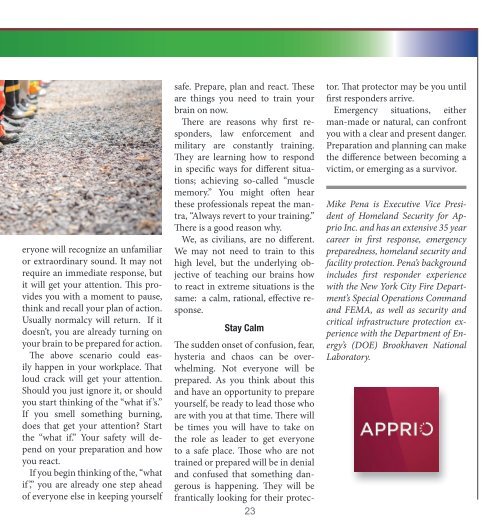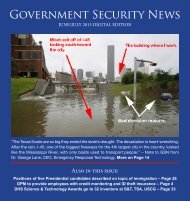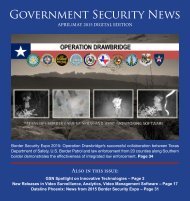GSN Magazine June 2016 Digital Edition
Create successful ePaper yourself
Turn your PDF publications into a flip-book with our unique Google optimized e-Paper software.
eryone will recognize an unfamiliar<br />
or extraordinary sound. It may not<br />
require an immediate response, but<br />
it will get your attention. This provides<br />
you with a moment to pause,<br />
think and recall your plan of action.<br />
Usually normalcy will return. If it<br />
doesn’t, you are already turning on<br />
your brain to be prepared for action.<br />
The above scenario could easily<br />
happen in your workplace. That<br />
loud crack will get your attention.<br />
Should you just ignore it, or should<br />
you start thinking of the “what if ’s.”<br />
If you smell something burning,<br />
does that get your attention? Start<br />
the “what if.” Your safety will depend<br />
on your preparation and how<br />
you react.<br />
If you begin thinking of the, “what<br />
if ’,” you are already one step ahead<br />
of everyone else in keeping yourself<br />
safe. Prepare, plan and react. These<br />
are things you need to train your<br />
brain on now.<br />
There are reasons why first responders,<br />
law enforcement and<br />
military are constantly training.<br />
They are learning how to respond<br />
in specific ways for different situations;<br />
achieving so-called “muscle<br />
memory.” You might often hear<br />
these professionals repeat the mantra,<br />
“Always revert to your training.”<br />
There is a good reason why.<br />
We, as civilians, are no different.<br />
We may not need to train to this<br />
high level, but the underlying objective<br />
of teaching our brains how<br />
to react in extreme situations is the<br />
same: a calm, rational, effective response.<br />
Stay Calm<br />
The sudden onset of confusion, fear,<br />
hysteria and chaos can be overwhelming.<br />
Not everyone will be<br />
prepared. As you think about this<br />
and have an opportunity to prepare<br />
yourself, be ready to lead those who<br />
are with you at that time. There will<br />
be times you will have to take on<br />
the role as leader to get everyone<br />
to a safe place. Those who are not<br />
trained or prepared will be in denial<br />
and confused that something dangerous<br />
is happening. They will be<br />
frantically looking for their protec-<br />
23<br />
tor. That protector may be you until<br />
first responders arrive.<br />
Emergency situations, either<br />
man-made or natural, can confront<br />
you with a clear and present danger.<br />
Preparation and planning can make<br />
the difference between becoming a<br />
victim, or emerging as a survivor.<br />
Mike Pena is Executive Vice President<br />
of Homeland Security for Apprio<br />
Inc. and has an extensive 35 year<br />
career in first response, emergency<br />
preparedness, homeland security and<br />
facility protection. Pena’s background<br />
includes first responder experience<br />
with the New York City Fire Department’s<br />
Special Operations Command<br />
and FEMA, as well as security and<br />
critical infrastructure protection experience<br />
with the Department of Energy’s<br />
(DOE) Brookhaven National<br />
Laboratory.







